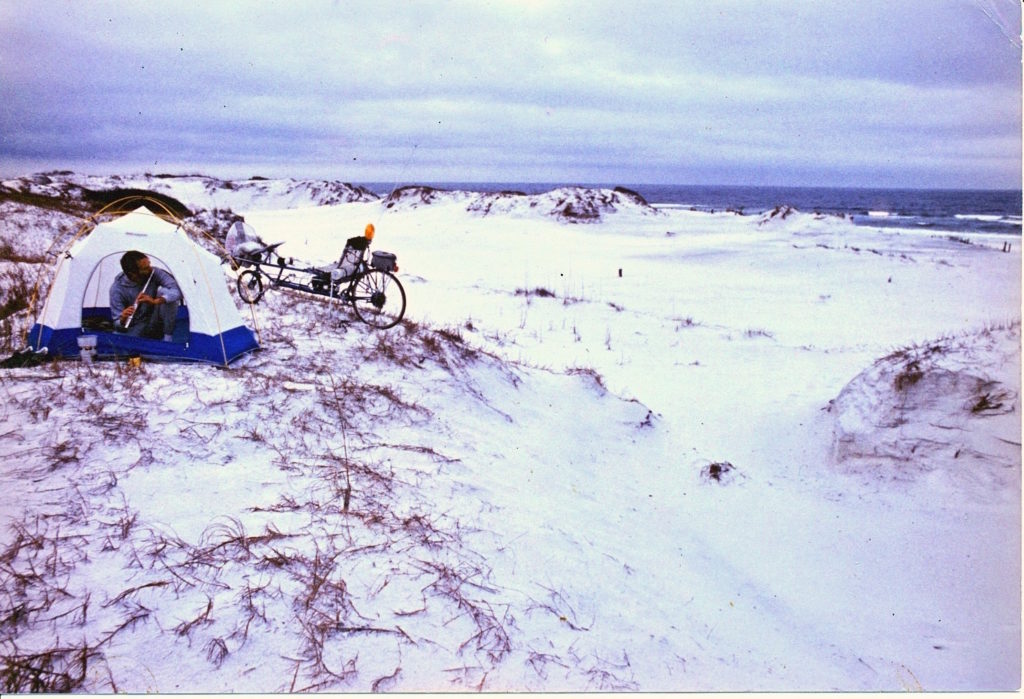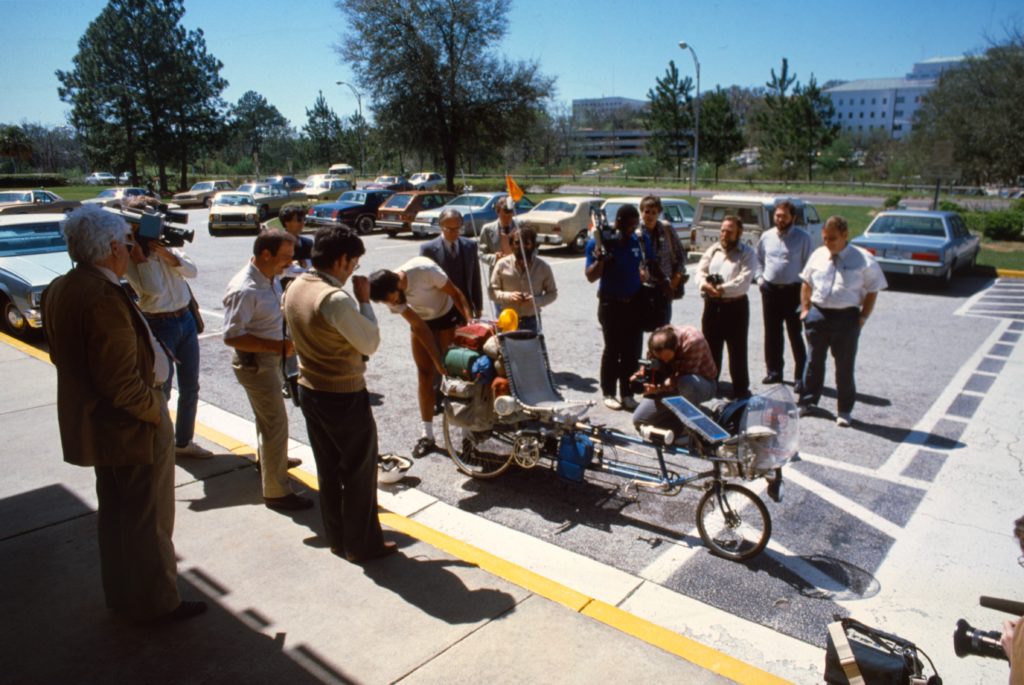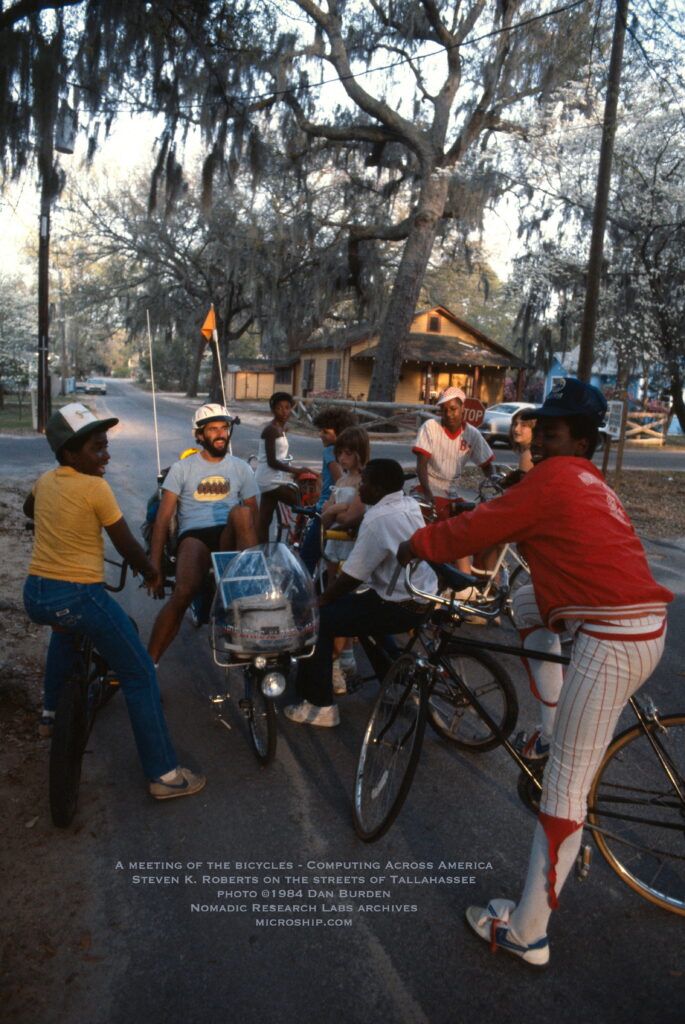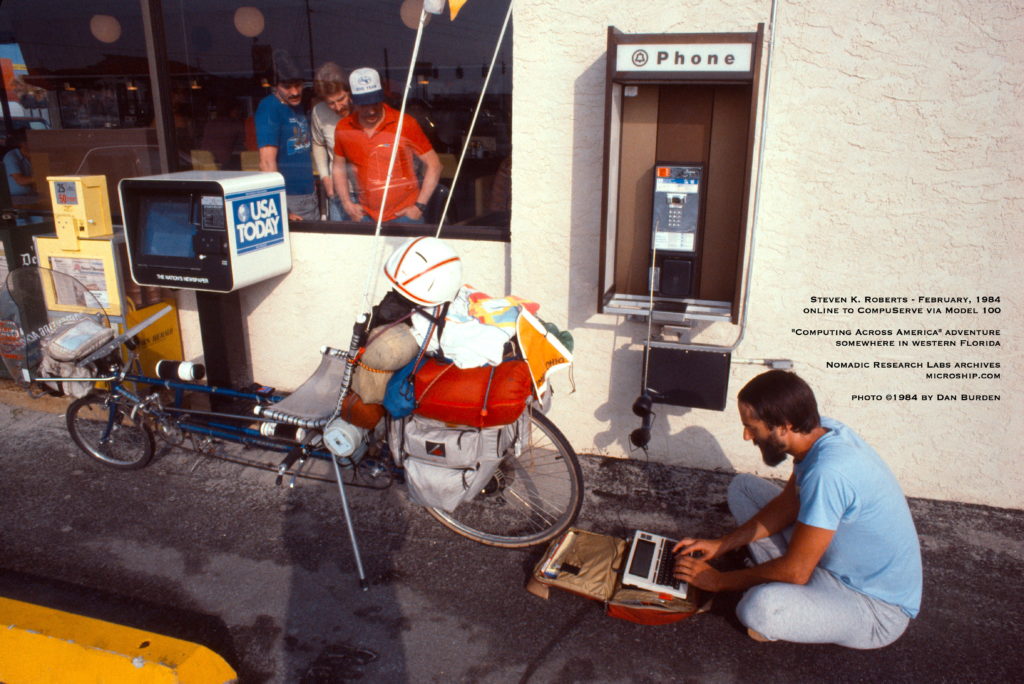
Fears, Burdens, and Dreams
Computing Across America, Chapter 26
by Steven K. Roberts
Tallahassee, Florida — March 22, 1984
photo above by Dan Burden
The bicycle is a learning machine.
— Dan Burden
Every subculture has its gurus and pioneers. The early wizards of the microcomputer world were elevated to legendary status within a decade of the industry’s birth; the stars of the science-fiction universe attract hordes of autograph seekers at conventions. Associated with every human passion from epistemology to model railroading is a small handful of Big Names.
And so it is with bicycling, and with every subspecialty that’s part of bicycling. There are famous frame builders, fat-tire acrobats, ultra-long-distance global travelers, and those human pit bulls of transcontinental racing who can crank out over four hundred miles at a stretch. There are people known for their bearings and those for whom racks are named. And if you start chatting with bikies about cycling organizations, group tours, and epic two-wheeled voyages, it won’t take you long at all to hear the name Dan Burden.
I had been hearing it since well before the start of my trip, for he had lived in Columbus long before I moved there. At least a dozen people told me that he was now in Tallahassee and that I’d be crazy to pass through without meeting him.
Dan and his wife Lys ran the local AYH council and often extended their warm hospitality to passing cyclists. He was also Florida’s bicycle coordinator, a government job that gives him the opportunity to establish policies that make cycling in the sunshine state “more friendly.”
But his reputation is national. He was one of the founders of Bikecentennial, the 1976 cross-country pedaling extravaganza that attracted 4,100 participants. The Montana-based organization lives on as a major cohesive force in the bike-touring world (now as the Adventure Cycling Association).
Along the way Dan has established societies, magazines and tours — acquiring fame far out of proportion to his quiet nature. And who would guess that this soft-spoken fortyish family man had made the better part of an Alaska-to-Argentina bicycle expedition called “Hemistour” (PDF story), publishing eloquent tales of the adventure in National Geographic?
Obviously I had to meet this guy.
Dan reacted to my phone call with enthusiasm. “Would you like a little media exposure on the way over?” he asked.
Never one to turn that down, I said, “Sure!”
“OK, can you be at the Department of Transportation at one o’clock?”
I rolled up to the government building expecting a reporter or two and perhaps a local minicam — but the entire capitol press corps had turned out for the occasion. There were four TV cameras, a few guys with tape recorders, and any number of hastily scribbling pencils. They swirled around me, asking questions and zooming in for close-ups, the reporters interacting with that balance of cooperation and competition that characterizes every society from insects to American business. Each sought an exclusive on some comment or angle but they cheerfully shared my random observations and demonstration rides around the parking lot.
Through it all, Dan stood by and watched, taking pictures of the people taking pictures, documenting the documentation. He had waved the magic wand that brought them all here, for he knew well the power of the press.

“On the first night of Hemistour,” he began, as we wheeled the bike inside to show the State Secretary of Transportation, “after five years of planning, dreaming, sewing packs, and fine-tuning — we had over half of our equipment stolen. It happened in a campground just outside Anchorage, Alaska, and we were devastated. Five years of dreams, ruined in one day.”
I started to commiserate, but he held up his hand with a smile. “A reporter came and wrote a story about us for the morning paper. By mid-day, people were pulling off the road to give us tools, clothing, packs, and food. One fellow handed us a cold package wrapped in white butcher’s paper, saying, ‘Here, I want you folks to have a steak dinner.’
“About an hour later, a lady took the four of us home, flung open the doors to a well-equipped shop, and told us to help ourselves. ‘We don’t have much,’ she said, ‘but my husband is a mechanic, and he says that if you need any tools or parts you’re welcome to take them.’
“You know, that whole experience really warmed our hearts. We had run into the rock-bottom of humanity — and it was only ten feet away from all that glows!”
I told him about the red guitar and the St. Christopher medal, mentioning my thoughts of getting a handgun. “Surely you carried a gun,” I said. “That’s some pretty wild country you went through.” I had decided against it myself because of varying state laws and the fact that any handgun heavy enough to be useful is, well, heavy. And somehow it wouldn’t feel right. But there were times when it would have been damned reassuring.
Dan chuckled. “Well, everyone advised us to carry guns. Everyone. We kept saying no, no, that’s not the purpose of this — we’re afraid of guns and we’d just hurt ourselves. Then about three weeks into the trip, we were traveling through the Yukon on the “top of the world” highway. After lunch Lys and June took off, then I started out. Greg Siple was the last one to roll, and I turned around to see the most ferocious animal in the world confronting him, blocking his path. It had reared up on its hind legs, baring its fangs and making the most awful sound…
“I just froze and watched — there wasn’t much I could do. Greg put his bike between himself and the animal and calmly stood his ground. And you know what? After a moment, the beast just dropped to all fours and ambled off into the forest.”
“Phew.” I was visualizing a grizzly.
As we neared the Secretary’s office, Dan gave up on my asking for details. “You know what kind of animal it was?” he prompted.
“Tell me.”
“A shrew. About three inches tall. Those things are absolutely fearless.” Laughing, we rolled the bike into the office and did the show ‘n tell, enjoying the incongruity of this human-powered touring machine and its shorts-clad pilot appearing in the plush offices of the gummint.
By nightfall, we were at Dan’s house — a place of bicycles, bicycle books, bicycle pamphlets, and bicycle memorabilia. He switched on the TV just in time to hear:
ANCHOR: …may be a dream to some, a nightmare to others. Well, there’s a man in Tallahassee today who does just that — and also earns a living while he’s at it.
REPORTER: 31-year-old Steve Roberts left his home town of Columbus, Ohio five and a half months ago. Since then, he’s covered 3,700 miles on a recumbent bicycle. The “recumbent” style of bike has been around since the 1930’s, but this one is equipped with solar panels to operate Roberts’ business-on-wheels, which is freelance writing.
ME: The solar panel charges a battery pack that runs the lights, security system, CB radio, computer, stereo cassette recorder, horn, fluorescent tent light, and anything else I can think of to plug in. I don’t have a hair dryer yet.
REPORTER: In case you’re wondering, the 160-pound, 18-speed machine can travel up to 44 miles per hour and cost over $5,000 to equip. Roberts writes books and magazine articles about computers and, as you might expect, bicycling. He says that the idea of being a freelance writer cooped up in an office didn’t appeal to him, so he hit the road. Now he can write while someone else does the office work.
ME: I have an assistant in Columbus who sits amidst all those things like I used to — all I do now is create text on the small computer and transmit it to her over the telephone. Her job is to deal with publishers, handle the mail, handle the money… and talk to creditors.
REPORTER: To some, the idea of riding a bicycle across the country and writing about it may seem a little strange. But Roberts says his experiences on the road keep him supplied with plenty of things to write about. This portable computer is what makes it all possible, because when he’s not cycling he’s writing stories and sending them to his assistant through a telephone computer network called CompuServe.
And so on. The usual. We hopped through the channels and heard the same story again and again, in different words. It all sounded wonderful, but the reality wasn’t quite so rosy. I signed on via the Burdens’ kitchen phone jack to get the latest word from Kacy:
- Rejection of a book proposal
- A fifty percent pay cut on my Online Today column
- Resignation of a key consulting client
- More threats from creditors
Sometimes I resented the speed of electronic mail — bad news travels quite fast enough through the postal system. Things were getting worse and worse, and that happy guy with the funny bicycle on TV seemed like someone else entirely — someone with a fat bank account, a book contract, and no house payments.
Ah, media image. How much longer could I keep it up?

“How did you fund your trip?” I asked Dan and Lys after regaling them with my financial woes. “Three years is a long time to travel without any income.”
“Well, we were supported by National Geographic. They covered the expenses and paid about $9,000 each for two article/photo packages.”
He showed me a May 1973 article — a spectacular spread of images portraying beauty, vastness, and both the pain and delight of the Anchorage-Missoula leg of their three-year expedition. The opening shot showed them wrestling loaded bikes through a huge sea of sticky mud; later there was a tasteful rear view of Lys bathing nude in an Alaskan waterfall, surrounded by verdant foliage and stunning mountainside terrain. I lingered on that one and she laughed.
“I have the distinction of being National Geographic‘s first Caucasian nude, you know.”
“Have you been on Johnny Carson?”
The evening naturally became one of story-swapping, and they had some beauties. The thought of cycling south of the border was a frightening one to me — Mexico was another of those unknowns that automatically translates into fear. I found myself asking them the same annoying question that people keep asking me: “What kind of problems did you have?”
“Well, as long as we stayed away from cities, we were fine. In our three-year expedition, we were burglarized three times, always in cities, always in US territory: Anchorage, Eugene, and Panama City.
“But to answer your question, I’ll tell you about two Mexican encounters. The first was in a little town in the Sonora desert of northern Mexico. It had become our custom to seek out the smallest roads possible, and we found a tiny remote village where we spent the night with a delightful family.
“After breakfast, we packed to leave. The others hit the road one by one, and I was the last to say good-bye and pull out of town. I hadn’t been riding five minutes when my derailleur fell apart.
“My friends were already out of sight, and I wanted to get the thing patched quickly so I could catch up with them and let them know I was in trouble. But the idler had lost all of its ball bearings on the loose dirt road. I started crawling around on my hands and knees, hoping I’d be lucky and find a few — enough to make it work.
“Within one minute, over fifty people arrived to help, every one of ’em crawling around in the dirt on their hands and knees. In less than five minutes, we found all seventeen of the tiny bearings, spread out over a couple hundred feet.”
I smiled at the story and thought of the terrible things that people had told me about Mexicans. Were no cultural generalizations worth a damn?
“The other story happened in Cuernavaca,” he went on, “down south of Mexico City. The four of us were trying to find a place to stay when an Australian fellow pulled alongside in a car and asked us where we were going. ‘Argentina,’ we told him.
“He said that the owner of the car was a doctor and owned a pension. ‘Come on, you can sleep at the house!’ So we followed the car through the noise and bustle of Cuernavaca and on into a rich neighborhood, finally stopping at a beautiful home with a pool. The doctor was there — he cooked us dinner and spoke knowledgeably of medical science, even offering us free physical exams to make sure our bodies were holding up alright after so many months on the road.
“We agreed, and he examined us very professionally (although he did take quite a bit more time with the girls). Then he mentioned that he would be driving up to the States the next day.
“Well, we jumped at the chance. We were carrying over forty rolls of film for National Geographic — some of our best stuff. We had been afraid to entrust them to the Mexican postal system, so we carefully wrapped the box and gave it to him with money for postage.
“It turned out, unfortunately, that he was not a doctor at all but a very smooth con artist. He was gone, our film was gone, and the Australian’s money was gone. It wasn’t his pension at all; he had just broken in — and the car was stolen. The police told us he had many aliases and switched roles all the time. And as we had witnessed, he was an excellent talker.”
I groaned at the loss of the film. “Man, that’s over 1400 pictures!”
“Right. Well, three months later we were working at the Geographic office in Washington and… surprise! Someone walked in with the box of film. It had been found in an abandoned car in Vermont, probably after helping him pull off a few con jobs as a ‘National Geographic photographer.’ That certainly would have opened doors for him — it did for us.”
I had to agree about the effects of the media. Like it or not, noble or not, the various manifestations of the groupie effect have a lot to do with the acceptance that a traveler receives. Right there in Tallahassee, I changed overnight from curiosity to celebrity as a result of the media saturation. It seems to be the style among travel writers to play this down: Paul Thereaux told people on the train through South America that he was a geography teacher; Peter Jenkins received so little press that he was only recognized once during his walk across America.
This I find a bit incredible.
People open up to writers, for there is a glamour about the art, a mystique. It gets them talking, usually thoughtfully. Doors that don’t open to a traveler might open to a bizarre bike; those that don’t open to that might open to a computer. And if that doesn’t turn the trick, then the word “author” usually does.
I spoke of all this, admitting a vague shame in depending on image when self should be quite enough. “Hey!” he said, “Don’t let that bother you. Two days before the Christmas of ’72, Lys and I rode down out of the mountains to Solvang, California. We had a holiday layover planned just down the road in Santa Barbara, but we were cold and miserable — and there was no way in the world we could make it another thirty miles in Christmas traffic in the dark.
“In California, you know, it’s illegal to camp just anywhere. There were no recognized campgrounds nearby and we had to get out of the wind. So I climbed a long driveway to a house on a hill and knocked.
“A huge, obese woman answered and peered out at me suspiciously. I hastily explained that we were bicycling from Alaska to Argentina and that we needed to get out of the wind — could we possibly pitch our tents in the lee of her garage and perhaps get some water for cooking? She shook her head no and slammed the door.
“Well, I was desperate. I knocked again, and this time talked a while, hoping I would hit upon some subject that would reassure her. Finally I mentioned that we were writing for National Geographic and her whole face lit up. Bingo — the key words! But then she looked suspicious again and asked, ‘Well if you’re a writer, are you allowed to have a beard?’
” ‘Oh yes, ma’am,’ I answered. ‘A lot of writers have beards.’
” ‘Oh. OK then.’ And before we knew it, she had opened the garage door so we could sleep inside. The next morning, before we left for our Christmas stay in Santa Barbara, she cautioned us. ‘Now you be very careful in Santa Barbara,’ she said. ‘That place is full of Communists.’ It turned out that she and her husband were Birchers, isolated and terrified of all those unknowns out there. We assured her that we would be very careful.”
“And were you?”
“Oh yes, very.”
“What about the Commies?”
“They were delightful. They even attended the Unitarian Church.”
“No!”

We had a good laugh about ignorance and fear, and then sobered at the
realization that it’s universal — that almost everyone, including us, has at one time or another shrunk from a growth opportunity because with it comes the Unknown. The Unknown! What’s out there, anyway?
Disappointment? Derision? Danger? Defeat? Death? Disabled Derailleurs?
Those are all bad, certainly, but none of them are nearly as bad as nothing. None of those things can possibly be worse than the horror of Complacency that creeps like a psychic tapeworm into the mind, demanding a steady diet of the bland to let it propagate and infect those nearby. It’s insidious, evil, and epidemic in America. It slithers out of TV sets; it crawls from the pages of popular media. It hides in classrooms and slips unnoticed into vulnerable young brains.
And it does all this while masquerading oh-so-brilliantly as knowledge and truth. Complacency is the adulterant of passion, the assassin of curiosity, the lobotomizer of life itself.
A friend’s mother once listened to me talking excitedly about my upcoming journey and shook her head in protective maternal fright. She summed it all up without even realizing it: “But honey, there are things out there… there are things out there we don’t even know about!”
Right on.
It’s possible to have growth without risk, but it is growth of the slow, vegetable kind, rarely yielding those magical breakthroughs that make you light up with understanding. It doesn’t take anything quite so radical as an epic bicycle trip to do this, of course, only the courage to risk the Unknown. Any kind of Unknown — be it intellectual, geographical, cultural, scientific, physical… whatever.
Because the greatest risk of all is taking no risk. That’s the one that can really get ya, the death worse than fate.
So. Curious about something? Restless? Hungry for knowledge or change? Got a dream?
Go for it.


You must be logged in to post a comment.